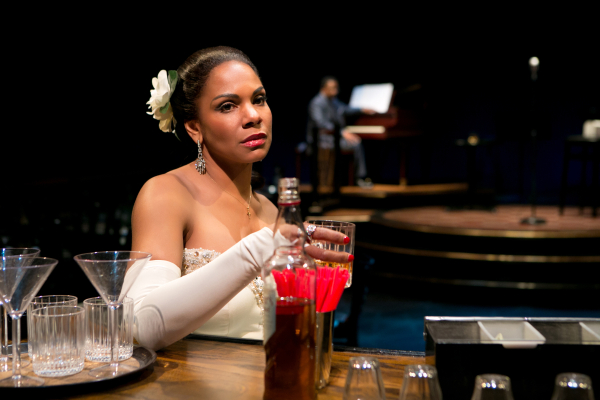Lady Day at Emerson's Bar & Grill

(© Evgenia Eliseeva)
If you close your eyes, you'll swear that the ghost of Billie Holiday is haunting the Circle in the Square Theatre. Five-time Tony Award winner Audra McDonald, whose glorious soprano is so instantly recognizable, sounds nothing like herself in Lanie Robertson's Lady Day at Emerson's Bar & Grill. She sounds like Billie Holiday — and it is eerie, not least because of her spot-on vocal impersonation. McDonald embodies the essence of the legendary jazz singer: a warm and personable entertainer with a melancholic aftertaste in her voice that you just can't kick.
The second bio-musical of the season to tackle the difficult subject of Billie Holiday (the first was the similarly titled Lady Day, starring Dee Dee Bridgewater), Lady Day at Emerson's Bar & Grill is now making its Broadway debut nearly 28 years after it premiered off-Broadway at the Vineyard Theatre. While both of this season's Billie Holiday-centered shows focus on the legendary singer near the end of her life, this one is a bit surer about its format and is consequently more focused.
The entire show takes place in March of 1959 at the South Philadelphia dive of the show's title. A small band composed of only a bassist (George Farmer), a percussionist (Clayton Craddock), and pianist Jimmy Powers (Shelton Becton) plays upbeat jazz music as patrons take their seats. Eventually, Billie Holiday (McDonald) stumbles in drunk from behind the bar. She softens the crowd with "I Wonder Where Our Love Has Gone" and "When a Woman Loves a Man," both immersed in the sweet and sad flavor one associates with Holiday.
But this is not a depress-fest. Holiday is in a cheerful mood tonight and wants her audience, whom she keeps referring to as her friends, to feel the same. She dazzles us with "What a Little Moonlight Can Do" and makes us laugh with "Pig Foot (And a Bottle of Beer)." She walks freely among the patrons (several audience members sit at onstage cabaret tables), usually to bum a cigarette or pour herself a tall glass of gin at the bar. In the process, Holiday regales us with stories from her life, some hilarious, some unspeakably sad. The simplicity of this cabaret format proves to be the best way to illuminate Holiday's story.
McDonald captures Holiday's increasingly erratic physicality with a terrifying realness, nearly falling off the stage at one point. After a brief detour to her dressing room to retrieve her Chihuahua, Pepe, one suspects she's consuming something much harder than gin. She sings "T'ain't Nobody's Business If I Do" as Pepe licks her face.
As Billie Holiday, McDonald punctuates songs with long pauses in which she sometimes appears to be falling asleep. Other times she seems to be sobbing into her tumbler. Try as she might to cheer up, she keeps getting dragged back to a dark place. "Somebody's on My Mind" and a chill-inducing rendition of "Strange Fruit" nearly send her over the edge. Billie Holiday favorite "God Bless the Child" is a highlight. Lighthearted at first, this rendition recedes gradually into bitterness as we see an unsettling realization flash across McDonald's eyes: Things will never get better. Yet for some reason Holiday still professes a naïve hope that she can find happiness with a family and her own little club.
Set designer James Noone's version of Emerson's Bar & Grill is a far cry from the tiny dive suggested in the program notes. With champagne table service and gold-fringed bunting hanging atop the stage, this place looks more like a Las Vegas showroom than a dive bar. That is especially clear when the mirror balls start spinning (lighting by Robert Wierzel). Yet as ghostly phonographs and faded photos light up from behind the upstage wall, one gets the sense that this place exists halfway between reality and fantasy.
Robertson notes that he was inspired to write this play after an ex-boyfriend described a performance Holiday gave in a North Philly bar that was attended by just seven patrons. "That image of the world's greatest jazz singer being so undervalued at the end of her life and career was an image that has always haunted me. Writing Lady Day at Emerson's Bar & Grill was an attempt to rid myself of that ghost." The thunderous applause McDonald (and, by extension, Holiday) receives at the end of this bravura performance is enough to exorcize any specter. When she's finally gone, however, we're left wanting much more.










